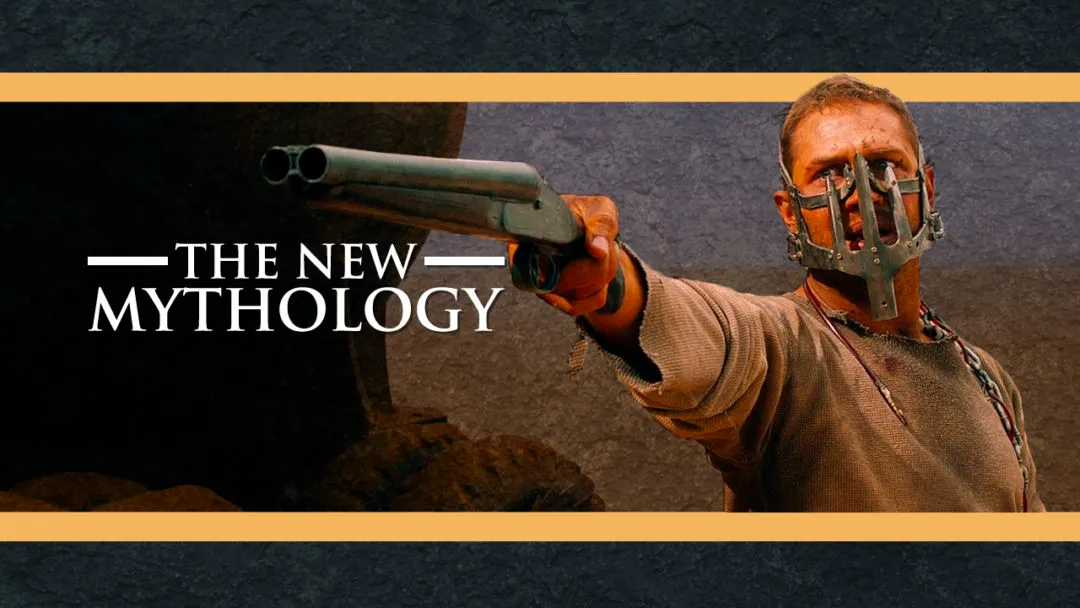As this decade ends, there’s perhaps no greater storytelling achievement in the action genre than Mad Max: Fury Road. It’s a Homeric epic. It’s a silent movie with sound. And it’s one of the few movies that never fails to make me cry from the sheer beauty of it all.
While a lot of praise has rightly been given to its stunning visuals and action choreography, the real strength of this modern classic is in its economical storytelling. Director George Miller uses every tool in his arsenal to bring the post-apocalyptic world to life with as little exposition as possible. But while the imagery in Fury Road does a ton to convey a story without words, it is Tom Holkenborg’s soundtrack which gives that story its emotion.
Tom Holkenborg describes the soundscape for the film as “over the top” “rock opera,” but he nonetheless takes pains to ensure that the score humanizes the action on screen. He elaborates that the goal was “to make sure that the drive, the aggression, but also the humanity was coming through in the score.” And he’s certainly succeeded, as the soundtrack of Fury Road informs the audience what the characters are feeling without the use of a voiceover or explicit dialogue.
The power of musical storytelling in Mad Max: Fury Road as a vehicle for empathy is most evident during Nux’s arc. When we first meet Nux, he’s a War Boy fully indoctrinated into Immortan Joe’s belief system, hoping to achieve glory through war. While topping off on some “donated” blood, he hears the pounding drums of the Doof Wagon, signaling that a convoy is heading out into the wastes for a sortie. The drums are exciting, and we can tell he’s eager to contribute. But the increasing chaos builds anxiety — as Nux probes the passing War Boys for the battle plan, we sense he feels left out, hooked up to his blood bag while the others prepare to ride. Nux is devalued under this system due to his declining health. War Boys live short “half-lives”, and are considered disposable heroes. They’re only truly appreciated in death, and considered worthless if they’re not able to fight. From the moment we’re introduced to Nux, he’s in a precarious situation.

When it’s time to pursue Furiosa, Nux’s lancer Slit ignores his questions and takes Nux’s steering wheel, intending on usurping his position. Nux protests, but Slit counters that “if you can’t stand up you can’t do war”. The only way that Nux is able to convince Slit to stand down and thus re-earn his respect is by announcing his intention to “die historic on the fury road”. Nux has staked his worth in the eyes of his peers on his inevitable martyrdom in the chase; his options are to go out in a blaze of glory and earn the praise of his society or spend his last moments in disgrace. Nux’s arc, his choice between death and dishonor, is reflected in the tension of the score.
What elevates Nux’s arc is how the music reinforces his emotional state through the use of leitmotif. In this case, one accompanies Nux’s intention to martyr himself. Each time Nux sees his opportunity to die for the cause, this melody plays right before he acts on his desire — the music swelling as if to convey Nux’s elation at his chance to go down in history as one of the greatest soldiers of his time. But as Nux grows and matures throughout the story, we’ll see that the phrase is recontextualized by his failure to live up to toxic societal standards, eventually resulting in his rejection of the warrior code.
The first appearance of Nux’s leitmotif occurs during the song “Storm is Coming” at 2:42, first heard in the film when Nux pursues the rogue tanker through a dust storm. Looking ahead, Nux sees his fellow pursuit vehicles crash and burn, then lift up in the winds of the storm before being torn apart in a fiery explosion. The way that the cars ascend in the air is like a visual representation of the promise of Joe’s belief system — die in war and you’ll be carried to a warrior’s heaven. The storm itself seems like an act of God; a terrifying gust of sand, thunder, and lightning. Nux reacts to the spectacle with pure awe. The music helps convey the idea that Nux is witnessing a nigh-mythical event, like the gates of Valhalla itself are opening for him to “die historic”. Inspired, Nux leaks fuel into the cabin of his pursuit vehicle, and drives full speed at the War Rig whilst holding a lit flare. Unfortunately for him, he is thwarted by Max before he can die in a literal blaze of glory. But Nux is undeterred. He’s convinced today is the day to he rides into Valhalla. Oh what a lovely day indeed.

The second instance of Nux’s Valhalla leitmotif occurs during “The Chase” at 0:40, heard in the film when the War Boy is given direct orders from Immortan Joe. Nux informs Joe of a way inside the War Rig, and is personally given Joe’s chrome revolver to kill Furiosa and thus prove himself worthy of the quasi-divine figure. He asks Joe if he is awaited in Valhalla, and when Joe replies that he will carry Nux to the gates himself, Nux is overcome with joy. Nux worships Joe like a god, viewing his acknowledgement with reverence and purpose.
We hear the leitmotif play gently under the dialogue, watching Joe spray Nux’s face chrome in a sort of post-apocalyptic baptism. The music soars as Nux is lifted onto the War Rig, but the melody is cut short when he trips and drops the revolver, denying the musical phrase (and his mission) a resolution. In this way, the music mirrors Nux’s own dissatisfaction at his failure, and marks a turning point in his character. At each stage of his emotional growth, the leitmotif reacts and reflects his inner turmoil.
The leitmotif’s third appearance occurs during the song “Moving On” at 1:09, first heard in the film as Capable (former “wife” of Immortan Joe) finds Nux crying on the floor in the upper cabin of the War Rig. Nux shares the shame of his failure with Capable, despairing that he won’t join the heroes of Immorta as he was meant to. He worries he’ll die without purpose, telling her “I thought I was being spared for something great.”
Capable treats him with compassion, stopping him from banging his head against the floor, lying down next to him, and listening to Nux without judgment or anger. She gives him a new perspective, telling him his destiny is not to do what Joe has commanded him to do. She acknowledges him as an individual rather than a cog in Joe’s war machine, telling Nux he can choose who and what he will live and die for.
The leitmotif reflects Nux’s potential to change. Up until now, the phrase was used to elicit the promise of immortality, playing during a perilous moment where Nux could ascend to Valhalla on another’s terms. This instance breaks the rule of three, playing during a personal moment between two former adversaries. They sit together as the music ebbs and flows, the arrangement playing at a slower tempo and in a higher key.

The phrase has shifted to suggest frailty, vulnerability and introspection. In just the span of a day, Nux’s entire worldview has been upended. He witnessed a sign of the divine, was disillusioned by failure, and was given a chance to think beyond his own status. The leitmotif illustrates Nux is at his lowest, but hints that redemption may yet be possible.
The final instance of the leitmotif appears in “Walhalla Awaits” at 1:20, heard in the film when Nux’s escape attempt is thwarted by Rictus.
Following Max’s suggestion, Furiosa, the wives, and the many mothers ride for the Citadel to capture it while it’s undefended. Furiosa has just killed Immortan Joe, and so the plan is for the survivors to transfer from the War Rig to Joe’s Gigahorse. Once the survivors are across safe, Nux will jam the throttle of the War Rig and use it to block the pass, preventing the remnants of Joe’s army from pursuing them. But then Rictus prevents him from leaving the speeding tanker, forcing Nux to make an uncharacteristically selfless and altruistic decision.
The leitmotif plays in all its triumphant glory as Rictus begins to rip the V8 engine out of the War Rig, all while Nux watches from behind the wheel. As Rictus lifts a chunk of the engine over his head, we see the flames from his sabotage reflected in Nux’s eyes. We’ve seen that look before — Nux’s realization that he has the opportunity to make the ultimate sacrifice. Only this time he’s motivated by the greater good, rather than his own fear of death and shame.
When we hear the leitmotif for the last time, it signals not slavish martyrdom but a selfless sacrifice, as Nux dies on his own terms in the service of people who care for him. The music accentuates the bittersweet emotions Nux feels in his final moments. He’s finally found a purpose in his life and met loved ones worth fighting for, but he already has to leave.
Whereas just yesterday Nux was eager to throw his life away, we see now that he’s quiet and contemplative. With pained determination, Nux points to Capable and whispers one final “witness me,” the only time this line is not shouted in the film. He jackknifes the rig, killing himself and countless others in the pile-up as the music swells, concluding Nux’s journey. He dies behind the wheel, fully in control of his life.

Subliminally, the purpose of the leitmotif serves to make us feel Nux’s anticipation, his disappointment, and his vulnerability. Since so much of his character arc is tied up in his internal struggle to value himself, the leitmotif is a powerful tool that allows us insight into feelings not visible on screen or spoken in dialogue. And because of our association of the leitmotif with previously unsuccessful attempts at a warrior’s death, when we hear it at the end of Nux’s life we feel the weight of his changes.
The music primes the audience to Nux’s emotional conflict before they’re consciously aware of it, making the payoff of his arc that much more cathartic. When Nux finally sacrifices himself so that the heroes of the story may escape, the musical phrase brings us full circle, eliciting a powerful feeling of closure and relief.
The movie concludes with an end card that reads “Where must we go, we who wander this Wasteland, in search of our better selves?” It’s a fitting question to a story about redemption and disillusionment.
Our Fury Road protagonists are broken people, their morals and beliefs corrupted by the desolation of the wasteland. They are haunted by loss: Max’s loss of humanity, Furiosa’s loss of community, and Nux’s loss of purpose. It’s easy for us to look at them and think that, like the desert that they live in, maybe they are too far gone. They are feral, cynical, or indoctrinated. But the difference between surviving and living is a sense of purpose, a hope for tomorrow. Human beings fundamentally crave that purpose.
Immortan Joe is evil in part for how he exploits the people of the Citadel mentally and physically, twisting their hope into a belief in a war culture through indoctrination. But as Max so sagely tells us before the finale of the movie: “You know hope is a mistake. If you can’t fix what’s broken you’ll go insane.”
Nux’s arc in Mad Max: Fury Road is so moving because he shows us that it’s never too late to start over, even at the end of your life. It all goes back to the movie’s theme of home. We can’t ever know peace in this world if we don’t find a way to fix our broken hearts. The score of the Fury Road is the beat of our protagonists’ weary hearts, telling us that if we push on, we might truly find who we’re meant to be. In death, Nux dies a true hero. Witness him.





